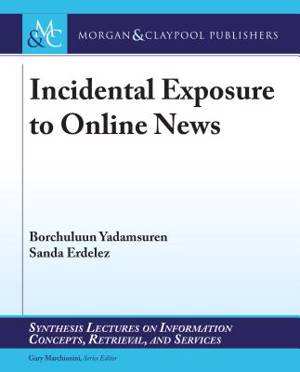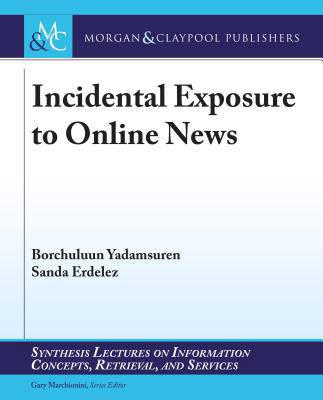
- Afhalen na 1 uur in een winkel met voorraad
- Gratis thuislevering in België vanaf € 30
- Ruim aanbod met 7 miljoen producten
- Afhalen na 1 uur in een winkel met voorraad
- Gratis thuislevering in België vanaf € 30
- Ruim aanbod met 7 miljoen producten
Zoeken
Omschrijving
Rapid technological changes and availability of news anywhere and at any moment have changed how people seek out news. Increasingly, consumers no longer take deliberate actions to read the news, instead stumbling upon news online. While the emergence of serendipitous news discovery online has been recognized in the literature, there is a limited understanding about how people experience this behavior. Based on the mixed method study that investigated online news reading behavior of residents in a Midwestern U.S. town, we explore how people accidentally discover news when engaged in various online activities. Employing the grounded theory approach, we define Incidental Exposure to Online News (IEON) as individual's memorable experiences of chance encounters with interesting, useful, or surprising news while using the Internet for news browsing or for non-news-related online activities, such as checking email or visiting social networking sites. The book presents a conceptual framework of IEON that advances research and an understanding of serendipitous news discovery from people's holistic experiences of news consumption in their everyday lives. The proposed IEON Process Model identifies key steps in an IEON experience that could help news reporters and developers of online news platforms create innovative storytelling and design strategies to catch consumers' attention during their online activities. Finally, this book raises important methodological questions for further investigation: how should serendipitous news discovery be studied, measured, and observed, and what are the essential elements that differentiate this behavior from other types of online news consumption and information behaviors?
Specificaties
Betrokkenen
- Auteur(s):
- Uitgeverij:
Inhoud
- Aantal bladzijden:
- 73
- Taal:
- Engels
- Reeks:
Eigenschappen
- Productcode (EAN):
- 9781627054911
- Verschijningsdatum:
- 7/12/2016
- Uitvoering:
- Paperback
- Formaat:
- Trade paperback (VS)
- Afmetingen:
- 190 mm x 235 mm
- Gewicht:
- 172 g

Alleen bij Standaard Boekhandel
+ 99 punten op je klantenkaart van Standaard Boekhandel
Beoordelingen
We publiceren alleen reviews die voldoen aan de voorwaarden voor reviews. Bekijk onze voorwaarden voor reviews.











